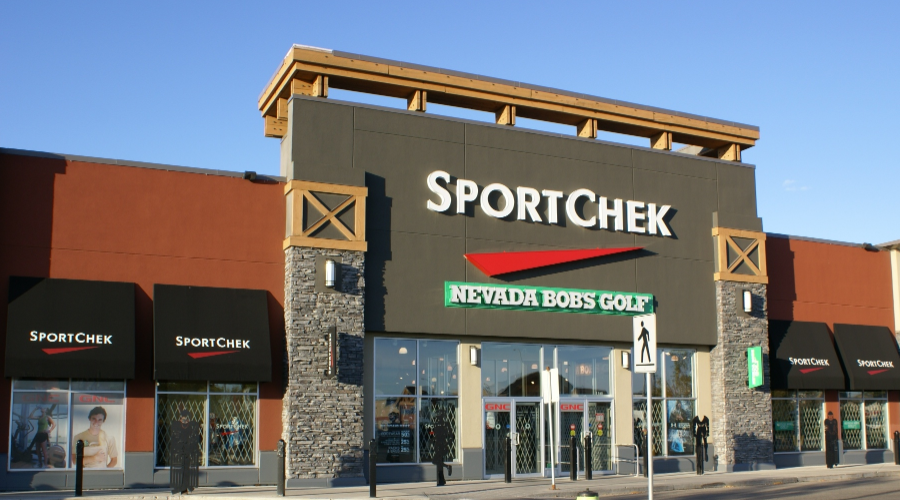While the sports retail business in the U.S. has been battered by a number of bankruptcies over the last year, FGL Sports and its Sport Chek flagship banner continue to thrive up north.
In the fourth quarter, same-store sales at FGL Sports, which is owned by Canadian Tire Corp., grew 5.1 percent against a decline of 0.4 percent in the same period a year ago. Comps at Sport Chek climbed 4.9 percent.
The arrival of winter weather across the country in December helped to drive sales and traffic to stores, offsetting the impact of poor November sales due to unseasonably warm temperatures. The sales increase in the quarter was driven largely by key categories including athletic and casual clothing and accessories, as well as by licensed clothing and accessories.
Retail sales in the quarter increased 6.4 percent on an adjusted basis that excludes inter-segment revenue. Net sales rose 5.2 percent to Canadian $624.7 million from C$594 million. Sales per square foot improved to C$299 from C$289.
FGL Sports’ gross margin rate declined in the quarter due to higher freight costs and an increase to the inventory obsolescence provision to align their methodology with its other retail banners.
“Our FGL Sports business continued to deliver solid top line results despite warmer temperatures in October and November which dampened sales of winter related products such as skis and snowboards,” said Stephen Wetmore, president and CEO of Canadian Tire, on a conference call with analysts. “We continue to build on opportunities across this business to curate assortments that are less weather sensitive and we saw strong growth in athletic apparel and footwear license products as well as wearable technology which helped to drive the top line. That said, when winter weather did arrive in December we saw strong sales at Sport Chek across all key categories as customers chose us as their destination for outdoor winter sports and activity.”
For the year, FGL Sports’ retail sales advanced 6.9 percent on an adjusted basis, while net sales gained 8.4 percent to C$2.2 billion. Same-store sales grew 6 percent, while Sport Chek’s same-store sales increased 7.6 percent.
The sales increase for the year was driven by strong sales performance in key categories including athletic and casual clothing and accessories, footwear, licensed apparel and winter categories, as well as higher year-over-year e-commerce. The footwear gain was supported by a double-digit increase in kid’s. Gross margin at FGL Sports and Mark’s was relatively flat year over year.
At the close of the year, FGL Sports had 433 locations, the same at the close of the prior year. Of those, 257 were corporate and 176 franchise stores. The count included 196 Sport Chek locations, 69 Atmosphere, 68 Sports Experts and 100 under four other banners: Hockey Experts, National Sports, Intersport and Pro Hockey Life.
FGL Sports was formed after Canadian Tire acquired Forzani Group in 2011 and has prospered since the acquisition. Over the last six years, same-store sales at FGL Sports have grown 6 percent in 2016, 4.4 percent in 2015, 6.9 percent in 2014, 7.7 in 2013 and 4.9 in 2012.
The company has benefited from improved in-store execution and merchandising, as well as the installation of new in-store digital features. In addition, FGL Sports relaunched its new e-commerce website at SportChek.ca in 2015, and launched Atmosphere.ca in 2016.
Particularly paying off was a move in 2012 to close over 100 acquired Forzani Group locations while shifting focus to the expansion of its Sport Chek banner stores. That eventually led to the opening of new-concept, large, urban flagship Sport Chek stores, starting in 2014.
Sport Chek currently has six flagships and a number of Hero locations, which are less expensive to build but carry a number of similar vendor shops and digital tools seen at the flagships.
On the call, Duncan Fulton, president, FGL Sports, said profitability at the flagships is improving as the company works on labor efficiencies. He noted that the flagships are helping Sport Chek gain access to better product. Fulton added, “As the vendors walk through those flagship stores it directly affects the line extensions that we get from them and the kind of products that they want to sell through our network, because it is that kind of retail experience that vendors want to associate their brands with.”
Fulton said Sport Chek will renovate a few stores to the Hero format this year but has no current plans for flagships. He added, “There’s a lot we can still get out of the ones that we have and the vendors are certainly very happy with the footprint we have there.”
He also noted that the company is making some changes to become less weather dependent.
“It’s great to be the store that Canadians want to come to whenever it’s wet or whenever it’s cold or snowing. But we can’t be completely reliant on winter weather for two of our four quarters a year,” said Fulton. “And I think there’s some other categories you’re going to see us expand and grow that already has some momentum in them.”
Still, Fulton told analysts not to expect any major changes at FGL Sports. Asked in the Q&A session, he said the company isn’t feeling the pressures sporting goods chains in the U.S. are facing and will look to build on its recent successes.
“There is a lot of optimism and opportunity right now to get more out of the assets that we already have,” said Fulton. “We have a great store network, we have a great brand, the categories that we play in we’re still seeing the kind of growth that we would want.”
He added, “You’ll see renovations and relocations in stores where it makes sense, but certainly there’s a lot of focus here for the next couple of years on getting a lot more from the assets that we already have.”
Image courtesy Sport Chek
















